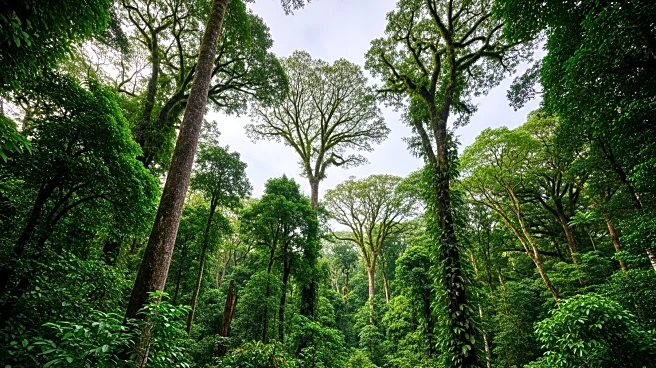What's Happening?
A comprehensive study has revealed that the largest trees in the Amazon rainforest are not only surviving but thriving, with a 3.3% increase in big trees per decade. This growth is attributed to the rising levels of carbon dioxide in the atmosphere, a result of burning fossil fuels. The study, involving nearly 100 researchers from 60 universities, was published in Nature Plants. Despite this positive development, scientists caution that these trees remain vulnerable to increasing droughts, lightning, fires, and ongoing deforestation. The Amazon, a crucial carbon sink, cannot offset the global carbon emissions alone, and its health is vital for climate stability.
Why It's Important?
The findings underscore the Amazon's critical role in mitigating climate change by absorbing carbon dioxide. However, the forest's vulnerability to environmental threats poses significant risks. If deforestation and climate change continue unchecked, the Amazon could shift from a carbon sink to a carbon source, exacerbating global warming. This would have dire consequences for local communities, including Indigenous groups who rely on the forest. The study highlights the urgent need for conservation efforts to preserve these intact forest areas, which are essential for maintaining ecological balance and supporting biodiversity.
What's Next?
Future actions must focus on curbing deforestation and mitigating climate change impacts to protect the Amazon. Brazil's recent legislative moves, such as relaxing environmental licensing for infrastructure projects, could further endanger the forest. International cooperation and policy changes are crucial to safeguard the Amazon's future. Scientists emphasize the importance of preserving intact forests to prevent irreversible damage and maintain their role in carbon sequestration. Continued research and monitoring will be necessary to understand the long-term effects of climate change on these ecosystems.
Beyond the Headlines
The study raises ethical and cultural considerations, particularly regarding the rights and livelihoods of Indigenous communities dependent on the Amazon. The potential loss of biodiversity and cultural heritage underscores the need for inclusive conservation strategies. Additionally, the findings challenge the notion that increased carbon dioxide levels are beneficial, as they may lead to greater susceptibility to environmental stressors. This complex interplay of factors highlights the importance of a holistic approach to environmental policy and climate action.











